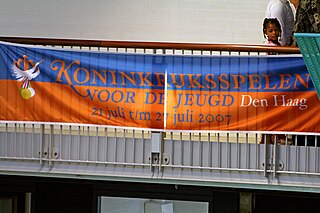
The Netherlands Antilles, also known as the Dutch Antilles, was a constituent Caribbean country of the Kingdom of the Netherlands consisting at of Saba, Sint Eustatius, and Sint Maarten in the Lesser Antilles, and Aruba, Curaçao, and Bonaire in the Leeward Antilles. The country came into being in 1954 as the autonomous successor of the Dutch colony of Curaçao and Dependencies, and it was dissolved in 2010, when like Aruba in 1986, Sint Maarten and Curaçao gained status of constituent country within the Kingdom of the Netherlands, and Saba, Sint Eustatius, and Bonaire gained status of special municipality of Netherlands as the Caribbean Netherlands. The neighboring Dutch colony of Surinam in continental South America, did not become part of the Netherlands Antilles but became a separate autonomous country in 1954. All the territories that belonged to the Netherlands Antilles remain part of the kingdom today, although the legal status of each differs. As a group they are still commonly called the Dutch Caribbean, regardless of their legal status. People from this former territory continue to be called Antilleans in the Netherlands.
Same-sex marriage is legal in Aruba and Curaçao, which are constituent countries of the Kingdom of the Netherlands. The islands are obliged to conduct same-sex marriages following a ruling from the Supreme Court of the Netherlands on 12 July 2024. In September 2021, a lower court in Curaçao ruled that preventing same-sex couples from marrying violates the equality provisions of the Constitution of Curaçao, but left the decision of whether to legalise same-sex marriage up to the Parliament of Curaçao. In December 2022, the Joint Court of Justice of Aruba, Curaçao, Sint Maarten, and of Bonaire, Sint Eustatius and Saba ruled on appeal that Aruba's and Curaçao's same-sex marriage bans were unconstitutional. The court order was set to go into effect on 7 March 2023 if not appealed to the Supreme Court; however, the governments of both Curaçao and Aruba subsequently appealed. On 12 July 2024, the Supreme Court upheld the lower court ruling, effectively legalizing same-sex marriage in Aruba and Curaçao with immediate effect.
The Benelux Office for Intellectual Property (BOIP) is the registration office for trademarks and designs in Belgium, the Netherlands, and Luxembourg. The BOIP is the legal successor of the Benelux Trademarks Office and the Benelux Designs Office. The BOIP is based at The Hague, Netherlands.

The Charter for the Kingdom of the Netherlands is a legal instrument that sets out the political relationship among the four countries that constitute the Kingdom of the Netherlands: Aruba, Curaçao, Sint Maarten in the Caribbean and the Netherlands in Europe. It is the leading legal document of the Kingdom. The Constitution of the Netherlands and the Basic Laws of the three other countries are legally subordinate to the Charter.

The Netherlands Antilles was an autonomous Caribbean country within the Kingdom of the Netherlands. It was dissolved on 10 October 2010.

The Kingdom Games was a multi-sport event, held every two years between the youth of the countries in the Kingdom of the Netherlands. At the final edition in 2009, these countries were the Netherlands, the Netherlands Antilles and Aruba. The 2010 dissolution of the Netherlands Antilles led to the cancellation of the 2011 and 2013 editions of the Games, and ultimately the Games were discontinued in 2014.

The Council of Ministers of the Kingdom is the executive council of the Kingdom of the Netherlands, which is a state consisting of four constituent countries: Aruba, Curaçao, the Netherlands, and Sint Maarten.
The Joint Court of Justice of Aruba, Curaçao, Sint Maarten, and of Bonaire, Sint Eustatius and Saba serves the three Caribbean countries of the Kingdom of the Netherlands and the three Caribbean special municipalities of the Netherlands. The court primarily hears disputes in first instance and on appeal of these six islands, and is on the same level as similar courts in the Netherlands. Since 2012, the court has also been authorized to hear inquiry procedures originated on Curaçao, of a type that would be heard in the Netherlands by the Enterprise Chamber in Amsterdam.

The Kingdom of the Netherlands, commonly known simply as the Netherlands, is a sovereign state consisting of a collection of constituent territories united under the monarch of the Netherlands, who functions as head of state. The realm is not a federation; it is a unitary monarchy with its largest subdivision, the eponymous Netherlands, predominantly located in Northwestern Europe and with several smaller island territories located in the Caribbean.

The following is an alphabetical list of topics related to the former nation of the Netherlands Antilles.

The Caribbean Netherlands is a geographic region of the Netherlands located outside of Europe, in the Caribbean, consisting of three special municipalities. These are the islands of Bonaire, Sint Eustatius and Saba, as they are also known in legislation, or the BES islands for short. The islands are officially classified as public bodies in the Netherlands and as overseas territories of the European Union; as such, European Union law does not automatically apply to them.

A common visa exists since the end of 2010 for the territories of Aruba, Curaçao, Sint Maarten and the Caribbean Netherlands which form together the territory of the Kingdom of the Netherlands in the Caribbean. The visa is not valid for the European part of the Netherlands, which is part of the Schengen Area.

Sint Maarten, a constituent country of the Kingdom of the Netherlands, has a government formed by the monarch, represented by the governor, and the ministers. The Prime Minister of Sint Maarten presides over the council of ministers. Executive power is exercised by the government. Legislative power is vested in both the government and parliament. The minister plenipotentiary is not part of the government and represents the Sint Maarten government in the Netherlands. The judiciary is independent of the executive and the legislature. The country is a parliamentary representative democratic country with a multi-party system. Sint Maarten has full autonomy on most matters, with the exceptions summed up in the Charter for the Kingdom of the Netherlands under the title "Kingdom affairs". The Constitution of Sint Maarten was ratified in September 2010, and entered into force on 10 October 2010.

.sx is the country code top-level domain (ccTLD) in the Domain Name System of the Internet for Sint Maarten.

.cw is the Internet country code top-level domain (ccTLD) for Curaçao. It was created following the decision on December 15, 2010 by the ISO 3166 Maintenance Agency to allocate CW as the ISO 3166-1 alpha-2 code for Curaçao. This decision followed Curaçao's new status as an autonomous country within the Kingdom of the Netherlands on October 10, 2010. The University of Curaçao, which already was the sponsor for .an was designated as the sponsoring organization. Registration of .cw domains was available from 1 February 2012.

The Dutch Caribbean are the New World territories, colonies, and countries of the Dutch Empire and the Kingdom of the Netherlands located in the Caribbean Sea, mainly the northern and southwestern regions of the Lesser Antilles archipelago.

Lesbian, gay, bisexual, and transgender (LGBT) people in Curaçao have similar rights to non-LGBT people. Both male and female same-sex sexual activity are legal in Curaçao. Discrimination on the basis of "heterosexual or homosexual orientation" is outlawed by the Curaçao Criminal Code.
Patent law in the Netherlands, or simply Dutch patent law, is mainly governed by the Kingdom Patents Act and the European Patent Convention. A patent covering the Netherlands can be obtained through three different routes: through the direct filing of a national patent application with the Netherlands Patent Office, through the filing of a European patent application, or through the filing of an international application under the Patent Cooperation Treaty followed by the entry into European phase of said international application. The Dutch patent has a term of 20 years and has effect in the Netherlands, Curaçao and Sint Maarten. Aruba has its own patent system.

The Constitutional Court of Sint Maarten is a court of Sint Maarten. As a constitutional court it evaluates the constitutionality of the provisions of legislation which is approved by the Estates of Sint Maarten and signed into law, but which has not entered into force. Procedures by the court may be initiated only by the ombudsman of Sint Maarten. As of July 2016, the court has decided two cases. Sint Maarten is the only country in the Kingdom of the Netherlands with a constitutional court.
Same-sex marriage has been legal in Bonaire, Sint Eustatius and Saba since 10 October 2012, the effective date of legislation passed by the States General of the Netherlands enabling same-sex couples to marry. The Caribbean Netherlands was the first jurisdiction in the Caribbean to legalise same-sex marriage, and was followed a few months later by French Caribbean territories, including Guadeloupe and Martinique, in May 2013.













